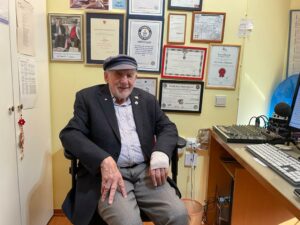
World’s oldest-living journalist and Holocaust survivor reflects on his remarkable journey, parallels between the Israel-Hamas war and WWII era, and his connection to Yad Sarah
At the age of 100, journalist Walter Bingham still produces two weekly radio shows from his home in Jerusalem, attends press conferences and travels the world.
Bingham’s entire life is an inspiring story, and one he is determined to continue as he grows older.
“I get my strength from there,” he says with a smile, pointing at the ceiling of his Jerusalem apartment, crediting God for blessing him with nearly perfect health, even at his advanced age. He and his daughter Sonja, also credit Yad Sarah for allowing him to continue to live independently. Walter is thankful he has never had to use Yad Sarah’s emergency call device that is hanging in his shower, or needed help from the organization’s emergency phone line, but both are important for bringing peace of mind.
Sonja, who has two grown sons and spends many hours volunteering with Chabad and other causes in Jerusalem each week, also oversees her father’s busy schedule and helps him with tasks like shopping and appointments. She says she is very grateful for Yad Sarah’s Yad Latomech service, which offers counseling and support to family caregivers.
“It’s very helpful to have someone to talk to, to know someone is there,” she says. “Yad Sarah is incredibly important for helping families.”
In fact, this family’s connection to Yad Sarah goes back to when Walter was a child in his hometown of Karlsruhe, Germany. His mother and grandmother, a leader in the Jewish women’s organization there, were friends with Sarah Lupolianski, the grandmother of Yad Sarah’s founder, Uri, and the namesake of the organization. Taking a book from his shelf about his hometown during the Nazi years and the Holocaust, he points to the entry about Sarah Lupolianski: “Deported to Gurs, (in the south of France), in 1940. Disappeared.”
Assumed murdered in the Holocaust, likely at Auschwitz, she is among the millions he thinks about everyday, especially now, with Israel at war with Hamas after the murderous attacks of Oct. 7 and antisemitism rising globally.
“We are again living like it is 1938,” he says. But in contrast to that period, when it was very difficult to get out of Nazi-occupied areas and when the British limited entrance to Palestine, he says the state of Israel will allow the Jewish people to survive and thrive.
“My message to Am Israel is to consider coming to Israel while you can, with all your possessions, in a planned manner, so that you do not have to run away with just a little suitcase like I did,” he says.
He was referring to a journey of escape that he began on July 25, 1939, his mother put him–her only son–on a train to England, part of the British Kindertransport effort that saved the lives of more than 7,000 mostly Jewish children by taking them out of Nazi-controlled territory to Britain, alone, without their parents.
“At the age of 15, I understood why I was being sent away, unlike a lot of the children around me who were 3 or 4 years old and felt abandoned by their parents,” he says. His father had already been arrested by the Nazis. “But I still started to cry when the train actually pulled away. It was really traumatic for everyone.”
It is also an experience he recently re-lived. Just a day after the Oct. 7 attacks, he and Sonja flew to Germany along with two others who were saved by the Kindertransport to embark on a long-planned re-enactment of the journey for an educational film.
“It was extremely important that we undertook this strenuous journey at this time,” he says, describing six days of a packed schedule of flights, trains and ferries that traced the original route from Germany to London’s Liverpool station, where he had arrived in 1939 to start to build his own life.
After living for a few years on a countryside estate in Wales with other Zionist youth, Walter joined the British army, becoming an ambulance driver, and later an intelligence officer, stationed in Germany when the war ended, responsible for investigating captured Nazi officials.
Eventually, Walter went on to become a journalist in London, got married and had Sonja in 1951. He also obtained a pilot’s license and acted in numerous movies and TV shows. He constantly thought about making aliyah, and eventually did in 2004 at age 80, following in the footsteps of his daughter, who had immigrated a few years earlier.
Looking back on his adventurous life, he immediately says his most meaningful memory is reuniting with his mother seven years after she put him on the train to London.
“We each did not know if the other was alive for all those years,” Walter says. But through a network of relatives, he learned in 1946 that she was alive in Sweden. She had been sent to several Nazi work camps after he left on the Kindertransport, but Swedish officials, allowed to rescue some Scandinavian Jews from the Terezin concentration camp near Prague, for reasons that are still not clear, stopped and picked up his mother and some other Germans along the way, ultimately saving their lives.
His father perished in the Holocaust.
Raising awareness of the Holocaust, along with reporting on events in Israel, including the war efforts and plight of the more than 200,000 Israelis evacuated from their homes in the north and south, continues to be important to Walter, who holds two Guinness World Records, for being the oldest living journalist and the oldest radio talk show host.
He also remains concerned about loneliness among the elderly, especially during the war and among Holocaust survivors. He has reported on Yad Sarah, and he ends every radio show with a reminder to listeners to visit their elderly neighbors.
“I am very fortunate to not be lonely,” he says, with Sonja, his eldest grandson, and many other relatives in Israel; and another grandson and two great granddaughters in England. “But loneliness is a killer.” He said that for many, Yad Sarah’s activities are important for preventing such loneliness. “It’s a very useful and very needed organization,” he says. “In fact, I may need to do another radio program about it.”


